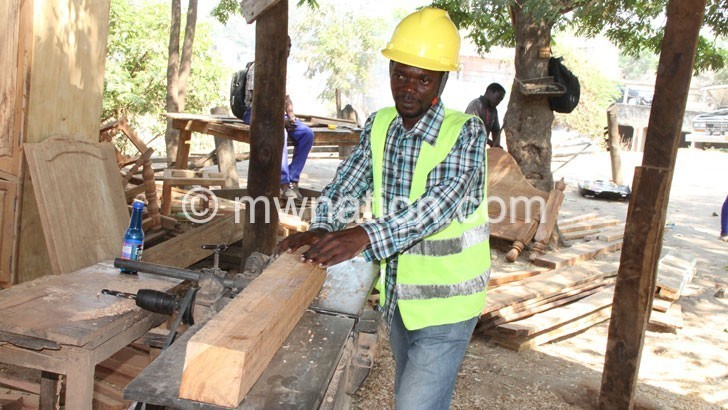Two decades of sharing skills
Growing up in Mwambali Village in Karonga District, Samola Tembo was just an ordinary young man.
Having scored unimpressive grades in Malawi School Certificate of Education (MSCE) examination, he took the road travelled by many of his peers not selected to public universities.
“My survival largely depended on piecework which reduced me to a hand-to-mouth livelihood,” he says.

Having tried everything his unskilled hands could manage to keep himself afloat financially, Tembo enrolled for carpentry and joinery training with the Technical, Entrepreneurial and Vocational Education Training (Tevet).
“I graduated with a Level One qualification. Over the years, I upgraded to a master craftsman,” he says.
In Tevet programmes, master craftsmanship is a status of honour conferred on trainees who have not only demonstrated outstanding skills in their trade, but also in running successful businesses.
They are mostly entrusted with the responsibility of training new entrants in the trade.
“Since 2005, I have trained over 70 learners. With supervision from a team from Tevet Authority [Teveta], they have established their own thriving businesses,” Tembo says.
Teveta spokesperson Charles Ziba says the monitoring exercise is key to ensuring the trainees are getting quality instruction.
“We monitor to see how they are performing because these are individuals who do not possess any formal training apart fromthe practical tutoring they receive from the master craftsmen,” he says.
Ziba says outstanding performers are encouraged to enroll in different programmes under Tevet where some have gone on to become master craftspeople like Tembo.
For 20 years, Teveta has been transforming lives through skills development in Malawi. The regulator of vocational training in the country has also been key in churning out a relevant and competent workforce for the industry, with every employer required to pay one percent of the payroll towards Tevet training needs.
The genesis
Teveta’s journey did not start without any setbacks.
Patrick Malunga was member of Parliament (MP) for Thyolo South West when the House passed the Teveta Bill in 1998.
Seated outside his home in Masambanjati in Thyolo, the ex-legislator recalls the interest the Bill generated and the subsequent scrutiny it was given.
He says: “For many of us in the House, the concept was new and we needed better understanding of what it stood for.
“We debated at length until a point where we gave a nod to have Teveta established. What won the hearts of the majority of the members was its focus on empowering the youth with relevant skills for economic independence.”
Malunga recalls that two decades ago, there was little interest in promoting crafts such as welding, carpentry and joinery and bricklaying among the youth who did not go far with their studies.
“We believed Tevet could be the right step towards ending the worsening unemployment problem,” he remembers.
Malunga finds it pleasing that 20 years on, Tevet is changing lives of young people who dominate the country’s population.
Facing the future
Since 1999, the Tevet sector in the country has undergone various reforms, including the establishment of community technical colleges, to ensure that the sector remains relevant and accessible for all.
Wilson Makulumiza-Nkhoma, chief executive officer for Teveta, says the biggest milestone over the years has been increasing access to Tevet programmes.
He said: “At the start, there were only seven public technical colleges with only about 400 trainees.
“To date, we are taking in excess of 6000 trainees a year and the number of colleges has expanded. On top of the seven colleges, we now have private and community technical colleges where we also send students.”
Nkhoma is also elated by the increase in the numbers of females joining the Tevet sector, a feat he attributes to continuous sensitisation efforts with the public.
Tevet is run by a levy on payrolls of both private and public institutions.
Previously, the levy collection was being done by Teveta. Due to challenges, government devolved this function to Malawi Revenue Authority (MRA) which deducts it the same way as pay-as-you-earn.
“With this arrangement, we have managed to increase the number of payers and the amounts collected,” says Nkhoma.
The idea of skills development is in line with government’s plans to turn the country’s youthful majority to an engine room of national development by increasing access to quality education, relevant skills and decent jobs.
It’s blueprint, Harnessing the Population Dividend, touts skills development as key to job creation, poverty alleviation and ending dependency on the aged minority.





